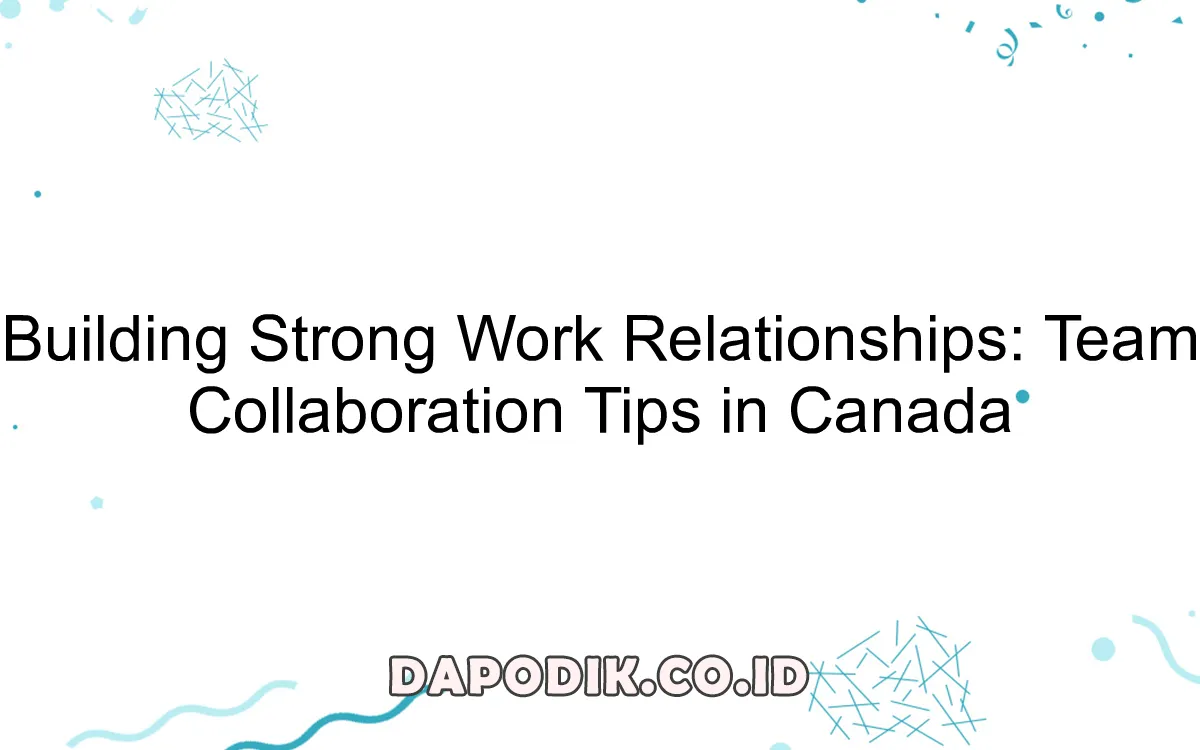Building Strong Work Relationships: Team Collaboration Tips in Canada
Building strong work relationships is crucial for effective team collaboration in Canada. In this article, we will explore valuable tips and strategies to enhance communication, trust, and cooperation among team members, ultimately leading to improved productivity and success.
Importance of Team Collaboration in the Canadian Workforce
Building strong work relationships through effective team collaboration is crucial in the Canadian workforce. With a heavy focus on collective decision-making and cooperation, Canadian businesses thrive when employees work together towards common goals.
Team collaboration improves productivity and efficiency. When individuals with diverse skills, knowledge, and perspectives come together, they can achieve more than they could individually. By combining their strengths, they can solve problems more creatively and effectively.
In Canada, teamwork is highly valued, and organizations actively encourage a collaborative culture. This collaborative mindset fosters innovation, as employees feel comfortable sharing their ideas and opinions. By working together, teams can generate new concepts, improve processes, and drive continuous improvement.
Team collaboration also enhances communication within the workplace. When employees collaborate, they regularly exchange information, provide feedback, and share updates. Effective communication prevents misunderstandings, ensures everyone is on the same page, and facilitates a smooth workflow.
Moreover, team collaboration builds trust and strengthens work relationships. When team members feel supported and valued, they are more likely to contribute their best efforts. A collaborative work environment promotes mutual respect, encourages active listening, and creates a sense of camaraderie among colleagues.
To foster team collaboration, Canadian organizations often implement strategies such as regular team meetings, brainstorming sessions, and cross-functional projects. These activities encourage teams to work together, promote open dialogue, and build a sense of unity.
Overall, team collaboration is of utmost importance in the Canadian workforce. It enhances productivity, drives innovation, improves communication, and strengthens work relationships. By fostering a collaborative culture, Canadian businesses can maximize the potential of their employees and achieve long-term success.
Effective Teamwork Strategies and Tools

In the fast-paced Canadian working environment, building strong work relationships and fostering effective teamwork is crucial for success. Team collaboration is not only about working together, but it’s also about maximizing productivity and achieving common goals. Here are some proven strategies and tools to enhance teamwork in the workplace:
1. Clear Communication Channels
Establishing clear and open communication channels is paramount in any team collaboration effort. Encourage team members to express their ideas, concerns, and feedback freely. Utilize communication tools like email, instant messaging apps, and video conferencing platforms to stay connected.
2. Regular Team Meetings
Schedule regular team meetings to promote face-to-face interactions and keep everyone updated on project progress. These meetings can also serve as a platform for brainstorming, problem-solving, and aligning team goals. Ensure agendas are prepared in advance to make the meetings more structured and purposeful.
3. Defined Roles and Responsibilities
Clearly define each team member’s roles and responsibilities to avoid confusion and promote accountability. When everyone understands their specific contributions, it becomes easier to delegate tasks, collaborate efficiently, and eliminate unnecessary overlaps.
4. Encourage Collaboration Tools
Utilize collaboration tools, such as project management software, shared document platforms, and task management apps, to streamline team workflows. These tools help centralize information, facilitate real-time collaboration, and enhance productivity within the team.
5. Foster Team Bonding Activities
Organize team-building activities or events outside of work to foster stronger bonds among team members. This could include team outings, volunteer work, or social gatherings. By creating a positive and supportive work environment, team members are more likely to trust, respect, and collaborate effectively.
6. Recognize and Celebrate Achievements
Recognize team members’ achievements publicly to boost morale and motivate others. Celebrate milestones, project completion, and individual accomplishments to foster a sense of satisfaction and teamwork. Acknowledging everyone’s efforts and contributions helps create a supportive and inclusive team culture.
7. Embrace Diversity and Inclusion
Appreciate and value the diverse perspectives, experiences, and backgrounds of team members. Encourage an inclusive work environment where everyone feels comfortable expressing their opinions. Recognize that different ideas and approaches contribute to more innovative solutions and stronger team dynamics.
8. Continuous Learning and Development
Promote continuous learning and development within the team. Encourage team members to attend training sessions, conferences, or workshops to enhance their skills and knowledge. By investing in personal growth, team members become more valuable assets, improving team performance collectively.
9. Constructive Conflict Resolution
Conflict is inevitable in any team setting. Encourage open dialogue, active listening, and respectful communication when conflicts arise. Teach team members effective conflict resolution strategies to resolve differences constructively and foster stronger working relationships.
10. Regular Feedback and Performance Evaluations
Provide regular feedback and conduct performance evaluations to help team members grow and improve. Constructive feedback ensures everyone is on the same page and can lead to increased productivity and overall team success.
Resolving Conflict and Building Trust within Teams
In order to build strong work relationships and promote effective team collaboration in Canada, it is crucial to focus on resolving conflicts and building trust within teams. Conflict can arise due to various reasons such as differences in opinion, miscommunication, or conflicting goals. However, by addressing conflicts in a constructive manner and fostering trust, teams can overcome obstacles and work together harmoniously.
1. Effective Communication
Clear and open communication is essential for resolving conflicts within teams. Encourage team members to express their opinions and concerns openly, while ensuring everyone listens attentively and respectfully. Active listening and effective feedback can minimize misunderstandings and foster a collaborative environment.
2. Establishing Common Goals
Aligning team members towards common goals can significantly reduce conflicts. Encourage team members to focus on shared objectives and emphasize the importance of working together towards accomplishing them. This fosters a sense of unity and collaboration.
3. Encouraging Collaboration
Promote collaboration among team members by encouraging them to work together, share ideas, and leverage each other’s strengths. Create opportunities for brainstorming sessions, collaborative projects, and cross-functional teams. When individuals feel valued and that their contributions are vital to the success of the team, trust and cooperation naturally develop.
4. Conflict Resolution Strategies
Implement effective conflict resolution strategies, such as encouraging open dialogue, seeking compromise, or involving a neutral mediator if conflicts become challenging to resolve. This allows team members to address conflicts promptly and constructively, preventing resentment from building up.
5. Building Trust
Trust is essential for successful team collaboration. Foster trust by encouraging transparency, reliability, and accountability among team members. Recognize and appreciate individual contributions, and provide constructive feedback to enhance personal growth. Trust creates a positive work environment and strengthens relationships.
6. Team-Building Activities
Organize team-building activities to enhance rapport and trust. These activities can include team outings, workshops, or team-building exercises. Such activities provide opportunities for team members to connect on a personal level, improve communication, and build bonds, ultimately leading to a stronger and more cohesive team.
7. Continued Learning and Development
Promote a culture of continued learning and development within the team. Encourage skill-building workshops, training programs, or mentorship opportunities. When team members feel empowered and supported in their growth, they are more likely to trust each other and collaborate effectively.
Conclusion
Building strong work relationships through team collaboration is crucial for success in Canada. By fostering open communication, encouraging diversity of ideas, and promoting a positive work culture, teams can enhance productivity, problem-solving abilities, and overall job satisfaction.

Posting Komentar untuk "Building Strong Work Relationships: Team Collaboration Tips in Canada"
Gambar ataupun video yang ada di situs ini terkadang berasal dari berbagai sumber media lain. Hak Cipta sepenuhnya dipegang oleh sumber tersebut.